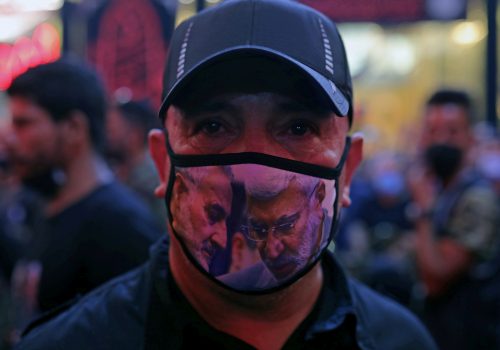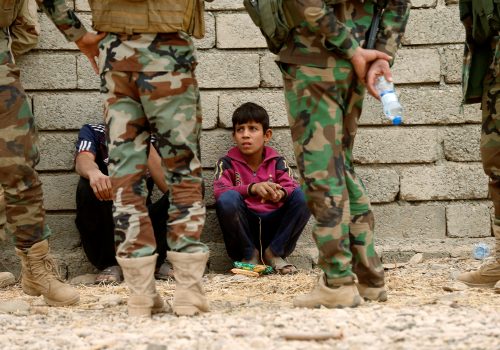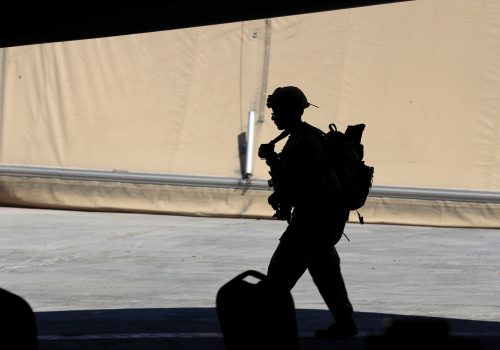Experts React: Assassination attempt on Iraq’s prime minister
This article was updated on November 9, 2021
On November 7, an explosive-laden drone attacked the residence of Iraqi Prime Minister Mustafa al-Kadhimi in Baghdad’s heavily fortified Green Zone. The incident, which Iraqi officials describe as an assassination attempt, reportedly injured seven of the prime minister’s security guards. In a video from a meeting with top Iraqi security officials, Kadhimi called the attack “cowardly,” noting that such acts “don’t build homelands and don’t build a future.” No one has claimed responsibility for the attack.
The drone strike took place two days after deadly protests in Baghdad over the results of the October 10 parliamentary elections, in which Iran-backed Shia militias lost more than half their seats, prompting calls that it was a fraudulent election. Iran-backed militias have used drones in a series of attacks on US bases in Iraq.
Below, Atlantic Council experts react to the news of the attack, assess the impact on Iraqi politics, and offer their analysis on how the international community may respond.
Jump to a reaction:
Nathan Sales: The US must be prepared to impose meaningful costs on Tehran
Andrew L. Peek: This is Muqtada al-Sadr’s moment
Barbara Slavin: It’s not in Iran’s interests to see Iraq dissolve into chaos
C. Anthony Pfaff: Iran still didn’t get the message
Tom Warrick: There needs to be consequences for those responsible
Matthew Zais: An opportunity to restore Iraq’s sovereignty
The US must be prepared to impose meaningful costs on Tehran
The failed drone strike on Iraqi Prime Minister Mustafa al-Khadimi is only the latest escalation in an ongoing campaign of violence by Iran-backed militias in Iraq. It comes on the heels of a series of attacks on US soldiers and diplomats in the region carried out by these groups using sophisticated drones supplied by Iran. The strike also takes place in the wake of elections in which the Iraqi people voted decisively to reject the influence of these militias and, more broadly, Tehran’s efforts to turn their country into a subservient client state.
We don’t yet know the Iranian regime’s specific role in the attack, but it appears to have Tehran’s fingerprints all over it. Initial reports are that the operation was conducted with Iran’s knowledge by Kataib Hezbollah and Asaib Ahl al-Haq, two US-designated foreign terrorist organizations (FTOs) that are notorious proxies of the Islamic Revolutionary Guard Corps’ (IRGC) Quds Force, another US-designated FTO. These militias receive money, advanced weapons, and strategic direction from Tehran. It seems improbable that they would have launched a brazen decapitation strike on the Iraqi government without their patron’s blessing.
Going forward, the United States should work with Iraqi partners—quietly as needed—to marginalize the militias, bring them under state control, and reduce malign Iranian activity in Iraq. Above all, the US must be prepared to impose meaningful costs on Tehran to deter further attacks by the regime and its proxies. The Joe Biden administration’s desire for a restored Iran nuclear deal must not lead it to overlook continued terrorism against our citizens and partners.
Nathan Sales, nonresident senior fellow at the Atlantic Council’s Middle East Programs.
This is Muqtada al-Sadr’s moment
Though an investigation is underway, the attack on Mustafa al-Kadhimi’s life suggests Iran-backed militias were responsible. Iran and its allied militias have the most to lose if their political representatives are cut out of a government. Moreover, given their crushing electoral defeat, they likely would be if they weren’t armed. The attack on Kadhimi was clearly a message that their interests and special status should be retained no matter the political outcome, and their representatives subsumed into the traditional Shia bloc, which forms the cornerstone of any Iraqi coalition government. But that way lies stasis and the status quo—exactly what the voters, in choosing Muqtada al-Sadr’s party, indicated that they didn’t want.
This, then, is Sadr’s moment. He won the October parliamentary elections, ran against outside interference, and has a private army. Sadr can take the hint, assemble the traditional bloc, and essentially wipe the slate clean of the militias’ losses. He can stand back, which amounts to the same thing. Or, Sadr can try governing without the Shia bloc, without other militias, and without, tacitly, Iran. Although this is what Iraqi voters are asking for, it’s very unlikely and high risk.
Andrew L. Peek, nonresident senior fellow at the Atlantic Council’s Middle East Programs.
It’s not in Iran’s interests to see Iraq dissolve into chaos
The ill-advised US assassination by drone of IRGC Quds Force leader Qassem Soleimani and Popular Mobilization Forces (PMF) commander Abu Mahdi al-Muhandis in January 2020 has left the Iraqi militia movement even more incoherent and reckless. It’s quite possible that the culprits in the attack on Prime Minister Mustafa al-Kadhimi did so without explicit approval from Tehran, even though Iran is the likely source of the armed drones used in the attempt. Hopefully, the attempt on Kadhimi will be a wake-up call to Tehran to try to rein in the militias and convince them to accept the results of the recent parliamentary elections. It’s not in Iran’s interests to see Iraq dissolve into chaos. The United States can help by not pointing fingers but by continuing to support the strengthening of government-controlled forces in Iraq.
Barbara Slavin, director of the Atlantic Council’s Future of Iran Initiative.
Iran still didn’t get the message
The defeat of Iran-backed political parties in the October parliamentary elections should have sent the message that seizing and maintaining power through violence and intimidation isn’t sustainable. The assassination attempt against Iraqi Prime Minister Mustafa al-Kadhimi, however, clearly indicates not everyone got the message. In fact, the attempt threatens renewed violence should Iraqis attribute the attack to Iran-backed militias and take to the streets again—as they did last year—to protest Iranian meddling. Kadhimi’s call for calm in the aftermath of the attack is certainly wise, however, it’s anyone’s guess how the street will respond.
The attack could provide an opportunity for the Iraqi government to rein in—even if just a little—Iran-sponsored militias that have violently extorted and suppressed the Iraqi population for years. The Sadrist victory has elevated Iraqi leadership with enough popularity and support from the Iraqi people to push through legislation or other reforms that could change these militias’ status as an independent element of the Iraqi Security Forces or reduce, if not eliminate, the roughly $2.4 billion they receive annually from the Iraqi government. While such legislation may not succeed, the threat of it could pressure the militias to reduce their malign activities.
Whether the attack was orchestrated by Iran, militia leadership, or a rogue element is largely irrelevant. To the extent the Iraqi people believe Iran was behind the assassination attempt, Iran and its proxies will likely find them more resistant to meddling and more violence counterproductive. Moreover, even if Iran didn’t sanction the attack, it makes sense to hold them responsible, as they put in place and sustained organizations whose only way to maintain their status quo is violence and intimidation. While any overt US role in holding may raise Iraqi sensitivities regarding getting dragged into the US-Iran conflict, quiet offers to assist with the investigation as well as improve security would likely be welcomed. The US could also use the opportunity to pressure Iran’s partners to limit their cooperation as long as Tehran plays such a destabilizing role in Iraq’s recovery.
C. Anthony Pfaff, nonresident senior fellow at Atlantic Council’s Middle East Program.
There needs to be consequences for those responsible
The November 7 multi-drone attack on Iraqi Prime Minister Mustafa al-Kadhimi represents a sharp escalation in political violence in the struggle to control Iraq’s future. No one claimed immediate responsibility. While there are several plausible suspects, the parties behaving the most suspiciously are the militias backed by Iran, which lost dozens of seats in Iraq’s October 10 election. The Iranian militias’ rival, the followers of Shia cleric Muqtada al-Sadr, understood the rules of how seats are allocated. The Iran-backed parties got more votes but split them among more candidates in each district, allowing the better-organized Sadrist candidates to win more seats. Sadr’s party is now the largest in the Iraqi parliament.
While the assassination attempt drew widespread criticism, even from Iran and several of the Iran-backed parties, this isn’t the first time in recent months that Iran-backed parties have been behind political violence to eliminate their opponents. Assuming it was an Iran-backed militia, which is responsible, the Iran-backed parties are counting on impunity to ensure their leaders face no consequences for the brazen attack. Lebanese militant group Hezbollah has gotten away with similar attacks on its opponents without facing serious consequences.
If ever there was a time for the countries of the Middle East to unite against Iran’s approach of backing militias that aren’t under the control of the state, the November 7 assassination attempt should be that time. Regional governments should come together to take common action to build a different vision for how to behave in domestic political disputes.
Iraq needs to conduct a credible investigation into the attack. “Round up the usual suspects” will not work to protect Iraq’s fragile democracy. There needs to be consequences for those responsible.
Thomas S. Warrick, nonresident senior fellow with Atlantic Council’s Middle East Programs.
An opportunity to restore Iraq’s sovereignty
The assassination attempt of Iraqi Prime Minister Mustafa al-Khadimi exposes the fragility of Iraqi statehood and the perils of ignoring Iranian influence in the country. As the United States has continued to define the Islamic State of Iraq and al-Sham (ISIS) as the primary threat in Iraq, Iran has played a different game. The facts on the ground paint a stark picture, where the Iraqi state lacks a monopoly over military force.
The attack occurred the day after Asaib Ahl al-Haq’s US designated terrorist leader, Qais Khazali, described previous attacks against Americans and similarly warned the Iraqi prime minister. It has been the PMF—not ISIS—who have flown drones and launched rockets against American and coalition bases, convoys, and personnel across Iraq. So the November 7 assassination attempt also highlights the paradox of numerous US administrations, which have focused on non-state symptoms of Iraqi state failure, such as ISIS, rather than on the larger state-based Iranian threats to Iraqi sovereignty.
The killings of Quds Force commander Qassem Soleimani and PMF leader Abu Mahdi al-Muhandis have both splintered the Iran-backed proxy movement in Iraq and highlighted a brief episode when the US was willing to address key threats to Iraqi and US interests. The assassination attempt on Kadhimi presents a rare window of opportunity for Iraq to consolidate and control the PMF militarily and politically and for the international community to address the true threats to Iraq. Both will be key to restoring Iraq’s sovereignty and ensuring the future viability of the state.
Matthew Zais, nonresident senior fellow with the Atlantic Council’s Middle East Programs.
Image: Image from Iraqi Prime Minister Mustafa al-Kadhimi's office showed on Sunday November 7, 2021. VIA Reuters.


